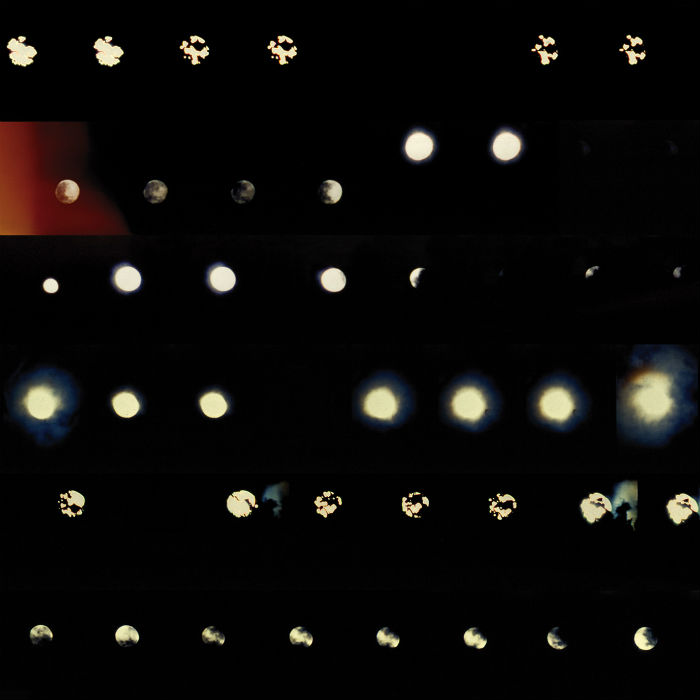Nmesh
Nu.wav Hallucinations
[AMDISCS]

“Nmesh has a few different modus operandi on Nu.wav Hullicinations, the first of which is the Macintosh Plus-/Mediafired-inspired 80s and 90s pop re-imaginings; the second is the more corporate stock music pastiche of 情報デスクVIRTUAL, and finally there is the VHS tape collage (minus the video of course) reminiscent of recent Everything is Terrible releases and some tracks by The Books. At points, all three of these techniques coalesce, almost as if the listener were in a spacecraft 20 light years from Gaia, where the radio and TV frequencies from Earth’s not-so-recent past all converge on a single receiver attempting to play every channel simultaneously. The first track, ‘THΞ GΘΘSΞ IS LΘΘSΞ,’ epitomizes this strange ambiance, as bits of Berlin’s ‘Take My Breath Away’ mix with samples from the Tom Cruise fighter pilot film that made it such an iconic song. As the album continues, samples from 80s and 90s pop hits that include Billy Idol, Frankie Goes to Hollywood, Soul II Soul, and Cathy Dennis songs introduce a heavy nostalgic mode, which makes the insertion of candy/Barbie commercials excerpts and Super Nintendo sounds seem to organically flow out of the haze of childhood memory.” [full review]
Mark Templeton
Jealous Heart
[Under the Spire]

“Jealous Heart harbors just as much nostalgia for tape as The Caretaker’s Empty Bliss did for old ballroom 78s, and it explores that sentimentality in a similar vain: by confronting the styles and the format most candidly. On the record at hand, this is accomplished extraordinarily well through the hushed haze of ‘Matinee.’ The comparison also holds water in that, like James Kirby, Templeton is exploring states of change that people have no control over, such as aging. But each set of results is different, due mostly to the latter pursuing a contemplative angle as opposed to an investigative one. The music therefore reveals itself as insular because of the echoic and fetishist grip residing in the sluggish, looped vocals; the clicking of buttons; and the speeding of reels on ‘Once We Were Down,’ which fastens analogue whirring with ambient jazz trumpets. A physical relationship with the cassettes is demonstrated in their being used as a tool for summoning shaded textures in, say, an underground space. On ‘Kingdom Key,’ it appears as though the artist is scrunching the material in his hands as the spools are peeled across a manipulated vocal loop. There is nothing bleak or sinister about the concept; it exposes a humbling degree of exploration, propelled by the combination of electro-acoustic hashing and hollow vocal segments.” [full review]
Nick Cave & The Bad Seeds
Push The Sky Away
[Bad Seed Ltd.]

“Leave it to Nick Cave to actually bring something new to this well-worn artistic conversation. While not always deliberate, the repeated allusions to memory and shadows that run through Push The Sky Away show their relationship to modern analysis of the thematic problem presented in Lolita: the conflict of age and memory. Except that Cave’s representation illustrates the decay of permanently fixed memories, deteriorating willfully in the face of informational mounds and gluts, not Humbert Humbert’s poetic ooze of pedophilia, the contrast of the movement of age and the stasis of memory (or, as expressed by Proust in Time Regained: ‘Indeed nothing is more painful than this contrast between the mutability of people and the fixity of memory[…]’). Cave’s is that of memories in half-life in accelerating decay: ‘Wikipedia is heaven/ When you don’t want to remember anymore’ (‘We Real Cool’), or ‘You’re the best girl I ever had/ Can’t remember anything at all’ (‘Higgs Boson Blues’). Most of Cave’s characters have the Humbert/shadow problem, yet they exist in a time and space where memory is stored in data banks so that trivial facts (with their strange pertinence on ‘truth’) can be recalled without the space of the brain being required.” [full review]
Foodman
Shokuhin
[Orange Milk]

A personal effort to qualify Foodman’s music in a traditional category stemmed from fascination and bewilderment, as opposed to a need to neatly label things in over-arching genres — and that jarring sensation of listening to something relatable yet disconcertingly foreign became part of the joy of exploring Shokuhin (released on Orange Milk, co-run by ex-TMTer Keith Rankin). Although it sits in a semi-familiar microcosm somewhere between the twisted paranoia of Gobby and the sardonic faux-gangster stylings of Paisley Parks (with a hint of Oneohtrix Point Never’s replicant miniatures thrown in), it revels in its own aesthetic bubble, a bizarre and miasmic pseudo-Japanese paradise noticeably more vague than his contemporaries. Morphing ephemera into semi-lucid collages, one can almost spot a Shinjuku-bound ganguro sitting on the subway next to a onsen-ready businessman, or even a posse of giggling schoolgirls ogling Masaki Koh on a billboard — yet as this fetishized maximum turbo vista begins to settle, it vaporizes in a hazy jam of footwork-inspired nonsense that recalls RP Boo through clouds of joyous smog, an aesthetic kaleidoscope that drifts between dimensions and loosely gestures at its listener to adjourn to a dreamscape — proudly — “Made in Japan.” Welcome to the world of Foodman. ☯ ☯ ☯ ☯
Jerusalem In My Heart
Mo7it Al-Mo7it
[Constellation]

“Exposing a tendency for cultural interplay is what makes Jerusalem In My Heart such a vibrant live outfit. They have been performing for eight years as a trio consisting of Moumneh, Malena Szlam Salazar, and Jérémie Regnier — artists from Lebanon, Chile, and France, respectively. The project is a cross-pollination of lights, music, visuals, and experimentation that comes together in what has previously been referred to as an ‘immersive, visual and theatrical experience.’ Since the group’s inception, collective output has hinged on this startling exchange of ideas and mediums that bombard the senses, not only in presentation, but in a contemporary approach to folkloric and traditional Arabic music. Dispensing these aspirations onto a single release was always going to be a tricky business, as the enterprise consequentially forgoes some of its major attributes. However, the resulting album, which is comprised of Moumneh’s home recordings, brings to the fore a deeply penetrating realization as he focuses creative energy purely on songwriting and structure — this while incorporating those Syrian cassette aesthetics alongside some extraordinary buzuk renditions. […] Mo7it Al-Mo7it constitutes a gentle merger, a meeting of ideas that sets the pace for a creative partnership both deep-rooted and fruitful — a daring kick-start for an act brimming with promise.” [full review]
Tape Loop Orchestra
In a Lonely Place
[Fracture]

“Film, like tape, disintegrates. However, Tape Loop Orchestra’s is a presentation of decay (as in Decasia) rather than an exploitation of it (as in Basinski’s Disintegration Loops). In exploring the relationship between repetition and decay, Hargreaves talks about the eventual, temporal revelation of the fragile thing. When substance is broken down through repetition, you come closer to what is at the core of the thing itself. He continues, and I respect him for this: ‘There is perhaps a bigger question about the divide between good and evil but I don’t think I’m qualified to answer such things, especially with something as abstract as music.’ It’s not that, as Auden said of Yeats, that the work of art is unable to act, to speak. Rather, that it was never going to do anything in the first place but live and die. The process is what In a Lonely Place is about. Suffice to say, it is a gorgeous process: that is, the phrase, meticulously composed, looped, developed, and finally broken down. I’ll spare you the purple prose, but I highly recommend you listen to it. Hargreaves is a master at what he does, which is repeat himself. If you’ve heard previous work by Tape Loop Orchestra, or even his band, The Boats (whose Ballads of the Research Department was a personal favorite from 2012), you will already know that I mean this as a compliment.” [full review]
Wolf Eyes
No Answer: Lower Floors
[De Stijl]

Where past records pierced or bludgeoned, No Answer: Lower Floors seethes. It doesn’t assault; it worms its way in past your usual defenses. Its vocals are not shrieks of horror, but a monotone that splits into two voices, acting in both sides of the stereo field so as to enter twice into each ear. Perhaps the most frequently cited characteristic of Burned Mind was the ‘stabbing’ bass lines. Here, however, the bass is yet another paranoid thought in a mass of delusions. It’s not so much phantasmagoria as the onset of anxiety, the tension that swells in the muscles of your shoulders when the merest uncertainties have built into an overwhelming possibility. No Answer: Lower Floors in this way feels like Wolf Eyes’ most honest work to date. While the lyrical content might discuss themes of madness and transcendence on ‘Choking Flies’ (‘Lose your mind on an empty street/ Empty minds please stay asleep’), it’s the delivery that contains humanity. The relaxed tone renders the lyrics into casual idioms, containing only a suggestion of their former violence. Behind them groan the off-kilter but locked-in rhythms of the electronics and the atmospheric tremble of new member James Baljo’s guitar. ‘Chattering Lead’ and ‘Confession of the Informer’ showcase Wolf Eyes’ polished skills in these arenas. Each return of bass or synth line constructs a foreboding mood without the use of the more facile tactics of crescendo or sheer sonic battery. [full review]
Stara Rzeka
Cien chmury nad ukrytym polem
[Instant Classic]

Stara Rzeka is not mere genre-mashing. The long-form pieces on Cien chmury nad ukrytym polem glide from Americana compositions to beat electronics to black metal are executed with so much sprezzatura that they place their importance not on the genres themselves, but on the shared atmospheric qualities related within. In some form of miracle of execution, the intense transitions feel natural and somehow make sense of their opposites. But by the end of the album, even this point feels like a distraction for what’s happening here. Like the person interacting with nature, understanding the juxtapositions in context misses the point — or, as the writer Clara Lispector said about the egg, “To understand is proof of error.” So maybe this is why I am so attracted to it: my unfamiliarity, complete ignorance of the Polish language, my weak understanding of black metal, my non-existent encyclopedia on modern electronic music, or that drawing history to Fahey, circuits, and corpse paint seems useless — again, like the person interacting with nature.
The Knife
Shaking The Habitual
[Mute]

“Clocking in at 97 minutes, this 3xLP has not been recorded with the ease of amiable track-hopping in mind, its purpose built for a single sitting. Although that case could arguably be made for any other record out there, the combined length of each number on Shaking the Habitual operates as one of the project’s principal components: an embodiment of reexamining assumptions about the listening habits of The Knife’s own audience. Aside from obliging the listener to ingest an aural clusterfuck of liberated curiosity and compromise, Shaking the Habitual exists as a gateway to some of the most compelling, stimulating, and unrivaled music the outfit have released to date. Absorbing the girth of this behemoth in one fell swoop is rigorous and harrowing; one comes away feeling ruptured, dislocated from expectation but determined to listen again. It would be easy to dismiss the whole thing as pretentious drivel, a wanky charade both pointless and irrelevant — it’s a justifiable standpoint, but one that lays waste to any audacity or inventiveness. […] As an album designed to be consumed as a whole, Shaking The Habitual is exhausting. But the experience is unique…” [full review]
DJ Rashad
Rollin’[EP]
[Hyperdub]

“A winter’s night on Rinse FM, and Kode9 and Cooly G are at the controls for the monthly Hyperdub show. The next track comes in, and it’s pure fire: a carnival-time snare-roll loop just long enough to make you wonder if it will ever end, just long enough to make your stapes purr. […] Right on cue, something changes: the drums tangle and stall, rhythmic thread trapped in a zipper. A slim palette of minor chords, molded zig-zag to pitch; a kick drum’s epileptic thump scattered across the mix. The snares return, choppier, a shorter, truncated loop that’s got you by the hair. Kode9 takes the mic: ‘Yeah, out to the Teklife crew!’ Well, shit. Of course this is footwork, of course it’s Teklife-affiliated. This is the Hyperdub show, after all, and we all know a DJ Rashad EP has been in the pipes for a while. Now that you mention it, it couldn’t have been anyone else. Anyone else, that is, apart from Addison Groove, the nom de guerre first used by UK dubstep producer Headhunter when he tried his hand at (heavily, very heavily) footwork-influenced bass rave bangers. Anyone else apart from Pearson Sound, the UK dubstep producer whose ‘Work Them’ (produced under his now-retired Ramadanman alias) deliriously pressed B-more breaks into Chicago juke shapes. Anyone else, in fact: because who expected footwork to open out like this, to adjust its contours to these new international pathways? Make no mistake. ‘Drums Please’ and the rest of Rollin’ is still recognizably footwork. Only footwork got a job, moved out of its parents’ house, and makes eye contact when talking to strangers; it might even pay taxes. Footwork now goes to nightclubs in Europe, smokes kush with design students, represents the street in magazines they only sell in the shops in art galleries. Footwork left you, the no-fi ghetto fetishist, behind: you were holding it back, and tomorrow is a day that has footwork’s name written all over it.” [full review]
